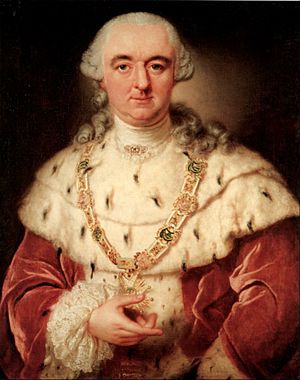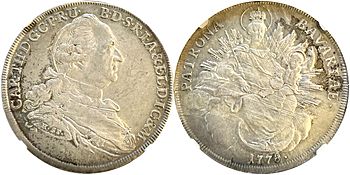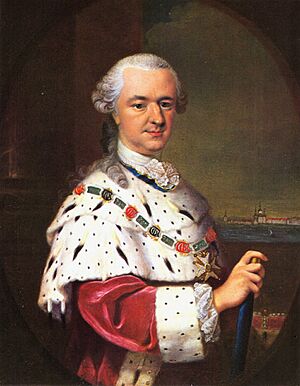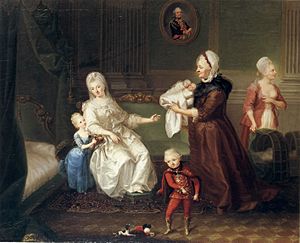Charles Theodore, Elector of Bavaria facts for kids
Quick facts for kids Charles Theodore |
|
|---|---|

Painted by Anna Dorothea Therbusch in 1763
|
|
| Elector Palatine Count Palatine of Neuburg |
|
| Reign | 31 December 1742 – 30 December 1777 |
| Predecessor | Charles III Philip |
| Elector of Bavaria Count Palatine of the Rhine |
|
| Reign | 30 December 1777 – 16 February 1799 |
| Predecessor | Maximilian III Joseph |
| Successor | Maximilian IV Joseph |
| Born | 11 December 1724 Drogenbos, Brussels, Austrian Netherlands |
| Died | 16 February 1799 (aged 74) Munich Residenz, Bavaria |
| Burial | Theatine Church, Munich |
| Spouse | Countess Palatine Elisabeth Augusta of Sulzbach Archduchess Maria Leopoldine of Austria-Este |
| Issue | (see below) |
| House | House of Wittelsbach |
| Father | John Christian, Count Palatine of Sulzbach |
| Mother | Maria Henriette de La Tour d'Auvergne |
| Religion | Catholicism |
Charles Theodore (German: Karl Theodor; 11 December 1724 – 16 February 1799) was an important German nobleman. He belonged to the House of Wittelsbach, a powerful royal family. Charles Theodore became the Count Palatine of Sulzbach when he was just six years old, after his father, Johann Christian, passed away in 1733.
Later, in 1742, at age eighteen, he became a Prince-elector and Count Palatine of the Rhine. This happened when his cousin, Charles III Philip, died. Many years later, in 1777, when he was in his fifties, he also became the Prince-Elector of Bavaria. This new role came after another cousin, Maximilian III Joseph, died.
Contents
Becoming a Ruler
Charles Theodore was part of the Wittelsbach family, specifically the Palatinate-Sulzbach branch. His father was Johann Christian. His mother was Marie-Anne-Henriette-Leopoldine de La Tour d'Auvergne. Charles Theodore was born near Brussels and grew up in Mannheim.
He became the Margrave of Bergen op Zoom in 1728. Then, in 1733, he took over from his father as Count Palatine of Sulzbach. In 1742, he inherited the Electoral Palatinate and the areas of Jülich and Berg. This happened after his cousin, Charles III Philip, Elector Palatine, died. To keep the family strong, Charles III Philip arranged a wedding for Charles Theodore. In 1742, Charles Theodore married Elizabeth Augusta.
As the ruler of the Palatinate, Charles Theodore was very popular. He started a science academy and made museums better. He also supported artists. When Maximilian III Joseph of Bavaria died in 1777, Charles Theodore became the Elector and Duke of Bavaria. He then moved to Munich, the capital city.
Challenges in Bavaria
When Charles Theodore became the ruler of Bavaria, he faced some challenges. He had children outside of his marriage, but these children could not inherit his main titles. He wanted to find land he could leave to them. He also dreamed of bringing back an old kingdom from the Middle Ages called the Burgundian Empire.
In 1778, Charles Theodore made a deal with Emperor Joseph II. He agreed to trade a part of southern Bavaria for some land in the Austrian Netherlands.
However, this plan was not popular. Maria Anna Sophia of Saxony, the widow of the previous ruler, and Charles Theodore's cousin, Charles II August, Duke of Zweibrücken, strongly disagreed. They were supported by Frederick II of Prussia and many other German states.
This disagreement led to a short conflict called the War of the Bavarian Succession. It ended with the Peace of Teschen in 1779. Charles Theodore kept Bavaria, but he agreed that his children born outside of marriage could not inherit it. Austria gained a small part of Bavaria called the Innviertel.
Charles Theodore had only one son with his wife, Countess Elizabeth Augusta of Sulzbach, but the baby died shortly after birth. His wife died in 1794. In 1795, he married Maria Leopoldine of Austria-Este, but they had no children. Another attempt to trade Bavaria for Austrian land in 1784 also failed.
When Charles Theodore died in 1799, Bavaria went to his cousin, Max Joseph, Duke of Zweibrücken.
Ruling Bavaria
Charles Theodore was never very popular as a ruler in Bavaria. He tried to trade Bavaria for the Austrian Netherlands and a royal crown, but he failed. He also struggled to manage the growing problems in Bavaria. At one point, he even moved his home to Mannheim after a disagreement with Munich's city council, but he returned a year later.
In 1785, he hired an American named Benjamin Thompson. Thompson helped Charles Theodore improve the army and many parts of the state. He became a very important minister.
Charles Theodore is also known for closing down a secret group called the Illuminati in 1785.
In 1794, French armies took over the Duchy of Jülich. By 1796, they were marching towards Bavaria. Charles Theodore asked Francis II for help. When Charles Theodore died in Munich in 1799, the people of Munich celebrated for several days. He is buried in the Theatinerkirche in Munich.
Even though he wasn't popular in Bavaria, Charles Theodore left his mark on Munich. During his rule, the English Garden, Munich's biggest park, was created. The city's old walls were also taken down to make room for a modern, growing city. One of Munich's main squares, Karlsplatz, is named after him. However, people in Munich often call it Stachus, after an old pub that used to be there. This shows that he was not as well-liked in Bavaria as he was in the Palatinate.
His Personality
| Silver thaler coin of Charles Theodore, 1778. | |
|---|---|
 |
|
| Front side This side shows Charles Theodore in armor. The Latin words mean: "Charles Theodore, by the Grace of God, Count Palatine of the Rhine, Duke of both (Upper and Lower) Bavaria, Archsteward and Elector of the Holy Roman Empire, Duke of Jülich, Cleves and Berg." |
Back side This side says: "Patroness of Bavaria 1778." It shows the crowned Virgin Mary with the Christ child, sitting on clouds. |
Charles Theodore was more interested in arts and thinking about ideas than in politics. People who knew him said he was a "poor idle creature" who loved plays, and had children outside of marriage. He was praised by the famous writer Voltaire, who sometimes visited him.
A French foreign minister described him as intelligent but someone who always let others guide him. He was often controlled by his ministers or his religious advisor. This made him weak and lazy. He filled his time with hunting, music, and secret relationships.
Charles Theodore also had a famous secretary, Cosimo Alessandro Collini, who had worked for Voltaire. Charles Theodore wanted to gain more land. He preferred land that he could leave to his children born outside of marriage through his will, rather than land that had to go to a legitimate son.
His Love for Culture
Charles Theodore loved the arts, especially music and plays. His court orchestra in Mannheim was one of the best of its time. The Mannheim School of music, including composers like Christian Cannabich, created new sounds that later influenced famous composers like Mozart. Mozart even tried to get a job with the Mannheim orchestra in 1777. In 1780, Charles Theodore asked Mozart to write the opera Idomeneo. Mozart said Charles Theodore called it "magnificent."
He had Italian opera singers and French actors perform at his court. Later, he opened the Nationaltheater, one of the first theaters in Germany to show plays only in German. A famous play by Schiller, "Die Räuber", was first performed there in 1782.
In art, he collected many plaster copies of famous old statues. A large collection of paintings, including works by Rubens, was moved to Munich and later became part of the Alte Pinakothek museum. His sculptors, like Peter Anton von Verschaffelt, created beautiful works.
Charles Theodore's main architect, Nicolas de Pigage, finished the Mannheim Palace. He also designed the Schlosstheater and the gardens at Schwetzingen Palace. These gardens included interesting features like artificial "Roman" ruins and a "mosque." He also built Benrath palace. These buildings show a mix of French and Italian styles, which was common in German courts back then. Charles Theodore also built the Old Bridge in Heidelberg, which is named after him as the Karl-Theodor-Brücke.
Charles Theodore saw himself as a "prince of peace," unlike other rulers who were great warriors. A small monument at Schwetzingen shows this idea. It says that a place where Roman and German soldiers once fought was turned into a spot dedicated to the "arts of peace" by Charles Theodore.
Family Life
Marriages
On 17 January 1742, Charles Theodore married Elizabeth Augusta of Sulzbach in Mannheim. They had one child, Francis Louis Joseph, who was born in 1761 but died the next day. His wife, Elisabeth Auguste, passed away in 1794.
On 15 February 1795, he married Archduchess Maria Leopoldine of Austria-Este in Innsbruck. They did not have any children together.
Children Outside Marriage
Charles Theodore had several children with other women. These children could not inherit his main royal titles.
With Françoise Després-Verneuil:
- Karoline Franziska Dorothea (1762 – 1816)
- A son (1764–1765)
With Maria Josefa Seyfert:
- Karoline Josepha von Bretzenheim (1768 – 1786)
- Karl August (1769 – 1823)
- Eleonore Karoline von Bretzenheim (1771 – 1832)
- Friederike Karoline von Bretzenheim (1771 – 1816), twin with Eleonore
With Countess Maria Anna zu Leiningen-Westerburg-Neuleiningen:
- Karoline von Ezenried (1771 – 1828)
Images for kids
See also
 | Delilah Pierce |
 | Gordon Parks |
 | Augusta Savage |
 | Charles Ethan Porter |








